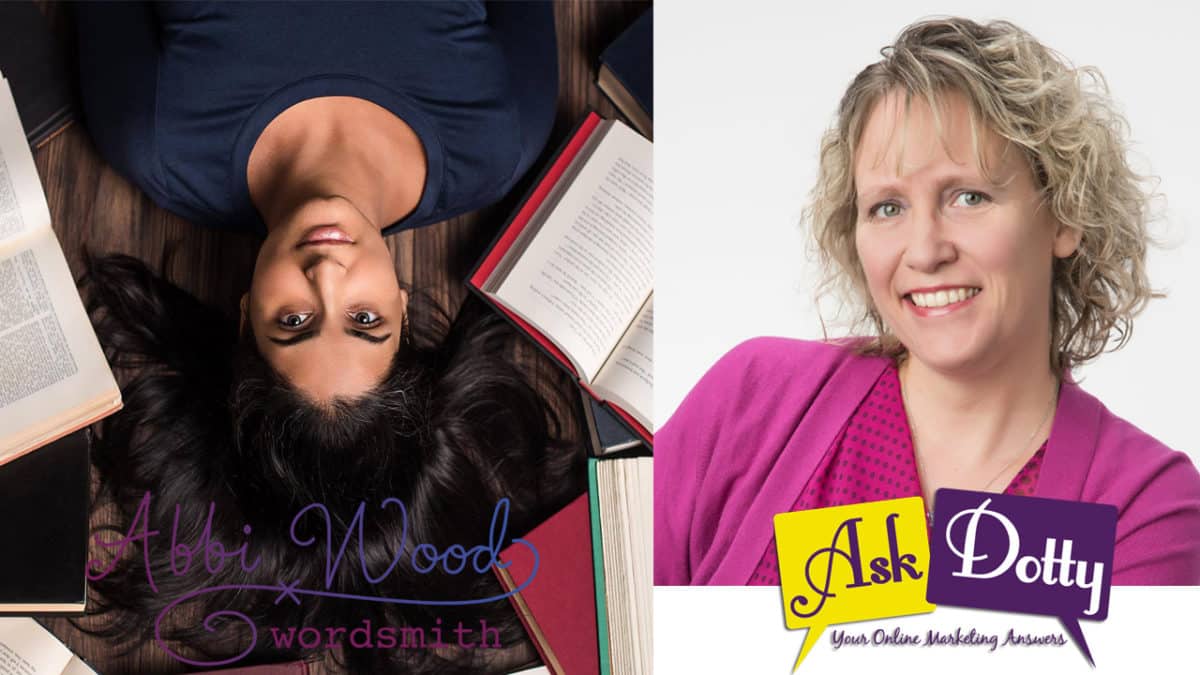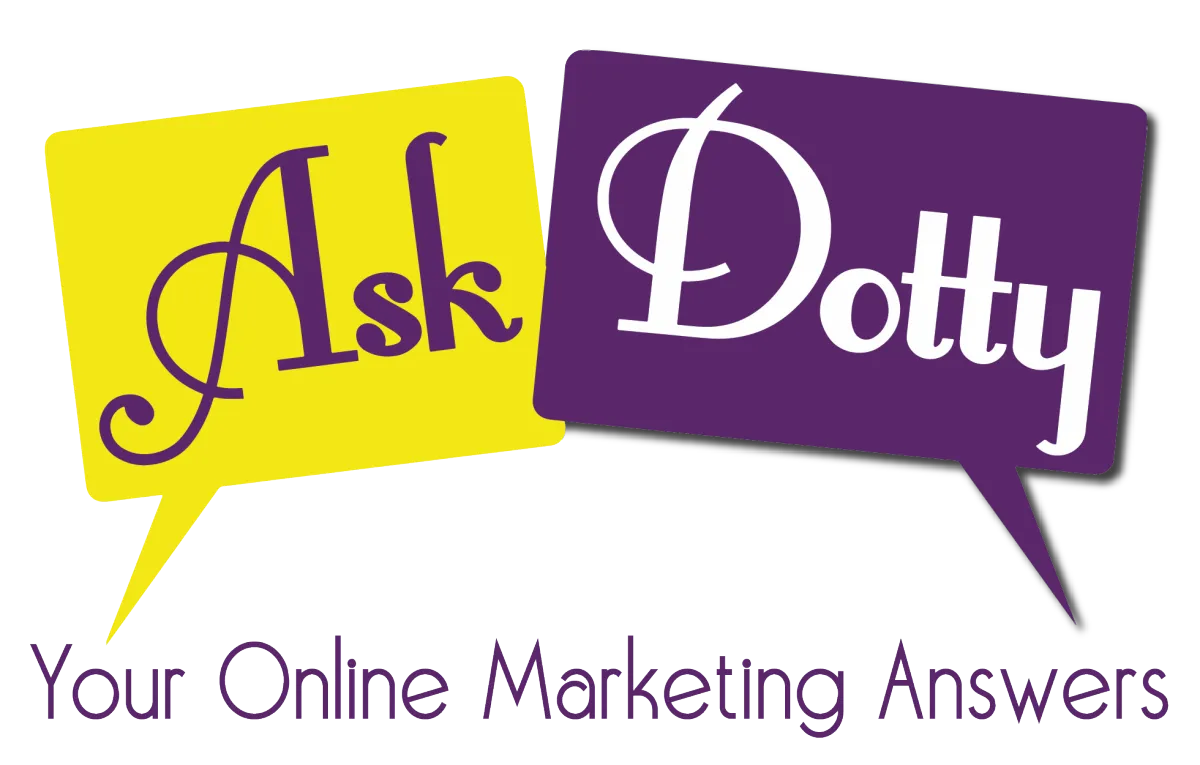
Website Copy Tips
Website Copy Tips
Better Website Copy Tips
Dotty interviews Wordsmith Abbi Wood about better ways to create the text on your website and other marketing pieces. Abbi works with business owners to polish the copy they have, or to help come up with compelling copy.
Dotty: As a website designer I get clients that really need help with creating content – some have it partially finished and others have nothing. What is the benefit to them to have you help with their content?
Abbi: Often when business owners give me content it reads like a brain dump of their thoughts. It is information you would see on a brochure. Information meant to inform and educate people and not meant to engage them.
Dotty: Ok – I understand what you mean if we are talking about Facebook where you are trying to get comments, feedback, and reactions to what you are saying. But when you are talking about web copy – what does that look like?
Abbi: Calls to action are a part of it. You don’t rely on the web copy to finish the conversation. Another technique is to use the second voice – you and your – to make the web copy like a conversation.
Dotty: So instead of talking at them you are trying to include them.
Dotty: As someone comes to you with their rough draft or ideas – what does it look like to work with you?
Abbi: It depends on how much they want to put into it and how much they would rather I put into it. Either way it is going to be like a partnership or team effort. They will either be delivering their diamonds in the rough for me to polish or we will be talking and I will be researching and doing the thing that I love to do – which is ask questions to get a 360 degree view of their business, their goals, and how communication is going to fit into that to help drive their business goals. Then go away and put it all together for them.
Dotty: I have worked with people that give me their information written down, and I have worked with people that would rather talk and have me write it down. How do you prefer to work with people?
Abbi: That is a really big difference between me and other wordsmiths. I believe if you can fill in a questionnaire then you have your rough draft and we can work on refining it. So if I am polishing you would have that in place already and I would come in to add polish. What I really love to do is video chat so I can see body language, ask questions, see and hear your answers and take notes without interrupting your flow of conversation.
Dotty: What are 3 things that people need to keep in mind when they are working with you?
Abbi: The first would be using 2nd voice – reaching out through the screen to make a connection. Think about if you are going to write the web copy in first person or third person. First person is I, me, this is what I do…third person is going to be…Dotty does this…She, her, him, they.
Dotty: Are there different instances where you would use both, or is it better to use one or the other?
Abbi: You could use both – if you have a company website with everyone’s bios – the bios should be in first person so they can reach out and make that connection. First person is more personable. It is relatable – it is one-on-one, person to person. Third person is coming at it from an outside perspective. I see third person more on company websites.
Dotty: So what I am hearing you say, if you are a solopreneur then first person is better and if you are a company with several people then third person is better.
Dotty: So what was the third thing on your list?
Abbi: Conveying personality. Whether you are a business to business or business to consumer you want to have a sense of flare, tone, and style to your language. You want it to be personable and relatable so people can connect. I call that Biznality. It is where I take the business owner and find the area where they intersect with that business, and we convey it in a way that is very real and true for them.
Dotty: That is a great word – Biznality. Can you give some examples of that? I have worked with people that are very humorous and lively, but the website text is very dry. Can you give some examples of how it interject some of the funness?
Abbi: When you go from speaking then presenting in a written format, it is very common to have 2 different voices. It can be like you are talking to 2 different people. It takes time to develop your written voice. It just takes time. As you write more you will start to get your writing voice. That is what is good about my process. As I record the interview I can hear and see them so I can transfer it to the written format for them.
Dotty: So do you actually write their web content for them, or it more of a collaboration between you and them?
Abbi: It leans more toward a collaboration, but I am definitely doing the bulk of the creative work. I will need them for the talking, interviewing, and answering all my questions so I can learn everything. Then I will need them again to review all the drafts that I develop. Sometimes they get stuck on a word – something they would never say. Then we find the word that will work for them. In that sense it is a collaboration as we find what works for them and their audience.
Dotty: What other communications can you help them with?
Abbi: Book projects, courses, translate videos into written format. If they are delivering a talk on stage I can come in and help structure it so that it flows organically from one section to the next. And in a way they are engaging the audience. I help them figure out how to impart the knowledge they have in their head to the audience – how will it be received and how will they make space for engagement.
Dotty: So you can help with any communications a business would need.
Abbi: I like to think so. It is my purpose in life to figure out effective communication. Right down to the nitty gritty of which word is it going to be – it fascinates me that integrity and freedom are 2 different words that can mean the same thing for people. Or taking one word – integrity – and it means different things to different people. Doing the exploration into what words are going to fit your purpose and you, and your audience in a way we can all come together – that is a really beautiful thing.
Dotty: I have a lot of customers that come to me as start-ups. They are really good at what they do but have no idea how to convey what it is that they do. Where do people need to be before they start to work with you?
Abbi: It depends. I can come in at different points of the projects life cycle. If it is at the very beginning we will go into an explorati0on of who they are, what their Biznality is, and who their audience is. During this process we will get into the business structure, what they do, what they offer, it will all come out in the interview.
Dotty: So you can help the business owner that does not have a clue what to say – all the way to a business owner that has been in business for some time and is more clear on what their Biznality is – you can help both?
Abbi: Yes. At every stage you have some sense of Biznality. We all grow and evolve in business. The language that works for you now is not what will work several years in the future.
Dotty: People think that when the website is done they can move onto the next project. I always tell them the website is never done – it is a journey. It will evolve and change over time. It sounds like you are saying this about all their business communications.
Abbi: Yes – text, photography, design, language, these are pieces that all play together to make a truly beautiful website. They all will evolve.
Dotty: Is there some parting words you have for our listeners?
Abbi: Wherever your language is in the process – whether you are writing something or preparing something to speak – as much as I polish and refine things – don’t worry about making things perfect before you implement it. Progress over perfection always wins. Done is better than perfect.
Dotty: So how can people get a hold of you?
Abbi: www.AbbiWood.com They can reach out to me through the website. I am always open for communications.


